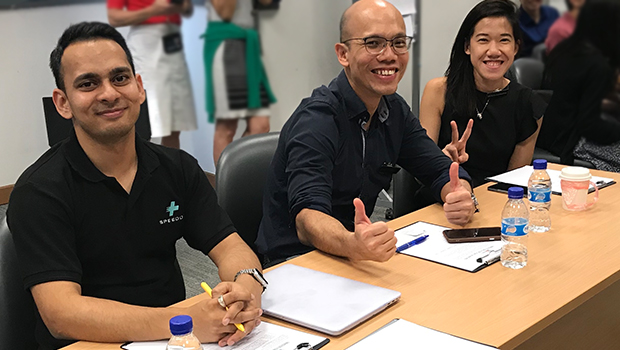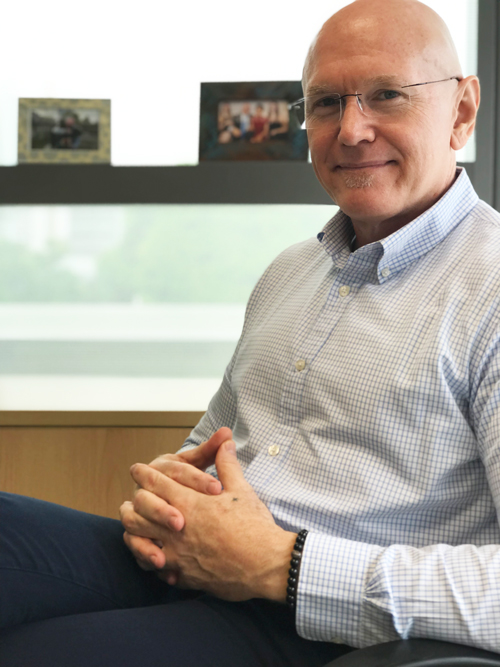The pioneering class of second year students who have appreciated the ‘Innovation and Design Thinking’ module and its objectives intensively.
Newly-carved second year module ‘Innovation and Design Thinking’ module at Duke-NUS Medical School, encourages students to create and test ideas that could potentially improve patient care delivery, through the strong emphasis on project work. Associate Professor Scott Compton, Associate Dean for Quality Assurance and Accreditation at Duke-NUS Medical School, weighs in on how this will help to shape our future clinicians.
Thinking out of the box to solve healthcare problems is increasingly becoming an imperative tool for physicians to possess in their life-saving medical kits. The refined and refreshed curriculum at Duke-NUS Medical School is helping to equip and nurture its students to tackle these problems head on in innovative ways.
Innovation Should Become Second Nature
On this pursuit, a newly-minted short module entitled “Innovation and Design Thinking” was conceptualised, explains Associate Professor Scott Compton, Associate Dean for Quality Assurance & Accreditation at Duke-NUS Medical School. “The inspiration for the new module came from the growing adoption of ‘hackathons’ in the tech industry, where computer programmers come together to collectively solve technological challenges. Our goal here is to create a similar experience, where students will collectively develop potential solutions for healthcare problems. To support them in this endeavour, we first educate them on the principles of design-thinking, which provides a framework for creatively developing innovative solutions to address existing problems,” he said.
These know-hows of applying problem-solving capabilities, beyond learning clinical care, are consistent with the key attributes of the ‘Clinician Plus’ persona that Duke-NUS strives to shape. Not only will Duke-NUS graduates be excellent clinicians, they will also be the future leaders, educators, scholars, innovators and scientists.
This module provided an opportunity for students to explore creative solutions to case studies on a spread of medical challenges. And it was very apt that two of Duke-NUS’ very own alumni conducted the session for our students.

Duke-NUS’ aumni, Dr Shravan Verma and Dr Rena Dharmawan, along with Dr Henry Hon (centre) of the Singhealth MedTech Office, served as judges of the students’ projects on the module, inspiring them with their stories in the process.
Dr Andrew Chia Chen Chou, SingHealth Orthopaedic Surgery resident and Singapore-Stanford Biodesign fellow, as well as, Dr Petty Pin Yu Chen, Medical Officer, Woodlands Health Campus facilitated the module. In addition, the second year students heard the success stories of two of Duke-NUS’ entrepreneurial alumni; Dr Shravan Verma and Dr Rena Dharmawan, who have been game changers in the medical community in their own rights. Their novel and successful innovations have transformed the way medicine impacts patients and their families. Dr Verma’s start-up, Speedoc built a complete end-to-end system for doctors and patients, so that house call doctor services can be provided with ease and minimal burden to people in the community. Dr Dharmawan’s Jaga-Me platform serves as an online tool to plug healthcare gaps with pool of nurses providing on-demand services.
Dr Verma and Dr Dharmawan, along with Dr Henry Ho of the Singhealth MedTech Office, served as judges of the students’ projects addressing potential solutions to real-life healthcare problems.
Dr Andrew Chou said, “As our students have background in a variety of disciplines ranging from engineering to finance to basic science, I was incredibly impressed by the creativity and depth of the solutions they developed to tackle unmet healthcare needs from Singapore and from across the world. I really hope the course inspires our future physicians to approach the challenges they face in healthcare with a patient-centred and solutions-oriented mindset.”
Added Associate Prof Scott Compton, “The imparting of knowledge by their seniors also gave our students insights on regulatory frameworks for protecting intellectual property and commercialising products and solutions into viable business ventures.”
Beyond Just An Academic Concept
Second-year student, Shaun Tay’s team’s project of designing an innovative solution to prevent needle reuse in rural Cambodia was selected as the winning entry for the challenge. His key takeaways from the module, he said, were to interact with the ‘Clinician Plus’ alumni who have driven him to aspire to shape similar career pathways.
Associate Professor Scott Compton highlights that the introduction of this module is just one of the latest enhancements in the research and scholarship thread of the Duke-NUS curriculum, which begins in the first year of study and culminates in the hallmark experience where students spend up to nine months of their third year immersed in a mentored-project.
Historically, all projects were required to be biomedical, hypothesis-testing research studies. Moving forward, however, students will be able to conduct non-research based mentored scholarly activities in areas such as Medical Technology (MedTech), education, policy, and patient safety, thus promoting the development of the skills and competencies necessary to be the future Clinicians-Plus that will help to solve healthcare problems in Singapore and beyond.

Associate Professor Scott Compton, Associate Dean for Quality Assurance & Accreditation at Duke-NUS Medical School takes pride in elaborating on the impact that the new “Innovation and Design Thinking” module is making on our students.
Tags:
;
;
;
;
Internal;
;
SingHealth;SingHealth Duke-NUS Academic Medical Centre;
Article;
Tomorrow's Medicine;
;
;
;
;
Academic Medicine;Education;Students;Residency
